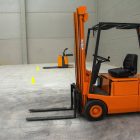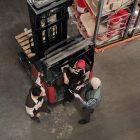Forklift hire can be a significant expense for businesses. But it doesn’t have to break the bank.
With careful planning and smart strategies, you can find cheap forklift hire options. And you don’t have to compromise on quality.
This guide will show you how to save money on forklift hire. It will cover everything from comparing suppliers to understanding hidden costs.
You’ll learn how to negotiate better deals and avoid costly mistakes. And you’ll discover how to get the most value from your forklift hire.
Whether you’re a warehouse manager, a construction site supervisor, or a small business owner, this guide is for you.
So let’s dive in and explore how to save money with cheap forklift hire without compromising quality.
Understanding Forklift Hire Costs
Forklift hire isn’t just about daily rates. It’s vital to understand all the associated costs. Knowing the full picture helps you budget more effectively.
Here’s a breakdown of typical costs:
- Delivery and Pickup Fees: The transport of the forklift to and from your location.
- Maintenance Charges: Regular upkeep and any necessary repairs during the hire period.
- Insurance Costs: Coverage for potential damages or accidents.
- Fuel Expenses: Depending on the forklift type (electric, diesel, gas), fuel costs can vary.
- Operator Charges: If hiring a forklift with an operator included in the service.
By understanding these components, you can make informed decisions about your forklift hire. Proper planning ensures no surprise expenses crop up. This comprehension is essential for optimising cost-efficiency while maintaining quality.
Comparing Forklift Suppliers for the Best Deals
Finding the right forklift supplier is key to a cost-effective hire. Start by gathering quotes from multiple suppliers. This gives a broader understanding of the price range and services offered.
Consider the following tips when comparing suppliers:
- Evaluate Service Packages: Check what’s included in each rental package.
- Read Reviews: Look at customer feedback for insights into reliability and quality.
- Ask About Discounts: Inquire if there are any special offers or bulk hire discounts.
- Verify Credentials: Ensure the supplier meets industry standards and certifications.
- Assess Equipment Variety: A wider selection allows better matching to your needs.
Negotiating effectively can also lead to better deals. Don’t hesitate to discuss your needs and seek customised options. A good supplier will be responsive and open to finding solutions that align with your budget.
Long-Term vs Short-Term Forklift Hire
Choosing between long-term and short-term forklift hire depends on your operational needs. Long-term contracts typically offer lower rates and can be ideal for ongoing projects. Conversely, short-term hires provide flexibility, though at a slightly higher per-day rate.
Consider these benefits when deciding:
- Long-Term Contracts: Cost-saving on daily rates and less frequent contract renewals.
- Short-Term Contracts: Adaptability for fluctuating projects and no long-term commitments.
- Flexibility: Ability to adjust based on project timelines.
- Budgeting: Short-term hires allow precise budget planning for temporary needs.
Evaluate your project scope and predict future needs before committing to a hire length. A thorough assessment can ensure you select the most cost-effective option that aligns with your project requirements and financial capacity.
Selecting the Right Forklift for Your Needs
Choosing the right forklift model is crucial for optimising costs. The wrong type can lead to inefficiencies and increased expenses. Consider the specifics of your job to match the forklift’s capabilities effectively.
To avoid unnecessary costs, evaluate:
- Load Capacity: Ensure the forklift can handle your typical loads.
- Terrain Type: Select models suited for your work environment.
- Lift Height: Choose a forklift that meets your vertical reach requirements.
- Fuel Type: Consider the cost implications of electric, gas, or diesel options.
Align the forklift’s features with your needs to avoid overspending on unnecessary capabilities. By selecting the right model, you optimise operational efficiency while keeping costs in check, securing both safety and savings in your forklift hire.
The Role of Customer Reviews in Quality Assurance
Customer reviews play a vital role in assessing the quality of a forklift hire service. They provide insights into the experiences of past clients, which can be invaluable in your decision-making process. Reading testimonials helps you evaluate the reliability and professionalism of a forklift supplier.
Pay attention to trends in feedback. Frequent praise or complaints on specific aspects can indicate areas of strength or concern. Look for comments on equipment condition, response times, and support services. Honest reviews highlight whether the supplier meets the expectations and demands of their customers.
By leveraging customer reviews, you gain a clearer picture of what each forklift hire company offers. This knowledge empowers you to make informed choices, ensuring you partner with a provider that delivers consistent quality and value. Prioritise suppliers with positive, detailed reviews for a smoother, more reliable hiring experience.
The Benefits of Off-Peak Season Hire
Hiring a forklift during off-peak seasons can lead to substantial savings. Forklift suppliers often reduce rates when demand is lower, making it an ideal time to secure cost-effective deals. Understanding seasonality can allow you to strategically plan your hires for optimal budget utilisation.
Seasonal discounts can significantly lower the overall costs of forklift hire. Here’s how timing plays a role:
- Lower Demand: Less competition for rentals means lower prices.
- Supplier Flexibility: Vendors are more willing to negotiate rates.
- Reduced Pressure: Schedule flexibility can lead to better service quality.
Leveraging off-peak periods gives you a financial advantage without sacrificing service quality. Analyse your operational needs to see if shifting forklift hires to these times can work for you. By taking advantage of these lower rates, businesses can optimise resources while maintaining operational efficiency.
Safety and Training Considerations
Safety should be a paramount concern when hiring a forklift. Proper training for operators is crucial to prevent costly accidents and ensure compliance with safety regulations. Investing in training may have an upfront cost, but it can save money by avoiding accidents and fines.
Qualified operators can manage forklifts more efficiently and safely, reducing the risk of mishaps. Here’s how focusing on safety and training helps:
- Accident Prevention: Reduces the risk of injuries and equipment damage.
- Compliance Assurance: Meets legal requirements and avoids penalties.
- Operational Efficiency: Trained operators lead to smoother workflows.
Ensuring that your team is well-trained can not only save costs but also protect your workforce. A well-implemented training program is crucial for safety and long-term savings. Emphasise regular updates to skills to keep up with technological advancements and regulatory changes.
Hidden Costs to Watch Out For
When hiring a forklift, hidden costs can catch you off guard. It’s important to be aware of these potential expenses to keep your budget in check. Some fees might not be immediately obvious but can add up over time.
Identifying and understanding hidden costs helps you make informed decisions. Keep an eye on:
- Damage Waivers: Fees covering potential equipment damage.
- Environmental Fees: Costs related to emissions and waste.
- Late Return Charges: Penalties for exceeding rental periods.
Being proactive and asking the right questions can prevent unexpected bills. Discuss all possible fees with your supplier upfront. This ensures transparency and helps avoid surprises when the invoice arrives. Being vigilant about these extra costs can help maintain your budget and prevent unnecessary financial strain.
Negotiating Added Value Services
Securing more value from your forklift hire requires skillful negotiation. Start by identifying services that could enhance your rental experience, like maintenance packages or free delivery. Approach your supplier with confidence and clearly present your needs. By highlighting the benefits of a long-term business relationship, you can often secure additional perks without extra costs.
The Importance of a Clear Hire Agreement
A well-drafted hire agreement is crucial for avoiding potential conflicts. Carefully read all terms and conditions, paying attention to details like maintenance responsibilities and early termination penalties. Clear understanding of the agreement ensures all parties are on the same page, minimising misunderstandings and safeguarding against unexpected fees.
Conclusion: Maximising Value in Forklift Hire
Saving money on forklift hire without sacrificing quality is achievable with smart strategies. Compare suppliers, choose the right forklift, and understand all costs involved. Consider long-term hiring benefits and stay informed about safety and training needs. With these insights, you can maximise the value of your forklift hire effectively.





